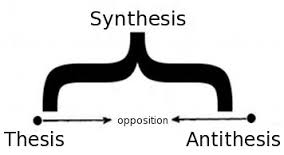Gemini Makes History: Op-Ed

The Hegelian dialectic typifies the cyclical course of history.
Georg Wilhelm Friedrich Hegel coined the concept of the dialectic–the belief that each generation, each hegemony, is characterized by a prevalent thesis–ideology–that is countered by an antithesis–opposing ideology. Conflict between the thesis and antithesis creates a synthesis, a new thesis, and the cycle repeats itself.
As I flip through my Barron’s A.P. Modern European History book, I see Hegel’s dialectic nestled within the chapters explaining Marx’s belief in a proletariat revolution in response to capitalism. I see it screaming from the absolutism that arose in response to the French Revolution’s drastic demand for equity between the Three Estates. A.P.U.S.H lends credence to the theory too. I see it in the rise of Reagan after a decade of hippies, LSD, and a chorus of “LBJ, LBJ, how many kids did you slay kill today?”
History is a tale of reactions followed by counter-reactions. History is born from conflict.
As a Gemini, I love viewing history in these dichotomous terms–through a bifocal lens that examines how yin galvanizes yang–how conservatism gives rise to liberalism–how the Levittowns and washing-machines of the 50s gave rise to the communal utopias and the feminine mystique of the 60s–how Cold War communism gave rise to the tearing of the Berlin Wall. The zodiac symbol, Gemini, depicts twin brothers Castor and Pollux: the dual nature of the sign causes Gemini personalities to be both intellectual and superficial, curious and restless, eloquent and indecisive.
I imagine Castor as history’s perennial thesis; he wears a black suit because black suits are always chic and hates to deviate. “Give women suffrage? Blasphemy!” he declared at the Seneca Falls Convention. His brother Pollux is the suave, hipster antithesis; clad in a beanie with a hole from a local thrift shop and large over-the-ear headphones from Urban Outfitters, Pollux swears by vegan. “The 19th Amendment must obliterate the prevailing spheres of domesticity!” he declared a week before before Elizabeth Cady Stanton and Lucretia Mott drafted their Declaration of Sentiments and Resolutions.
Maybe I’m a bit of a Romantic, but I find a certain beauty in this constant struggle. Like the lovers etched on Keats’s Grecian urn, history is in an eternal stasis of cyclical change.
The Hegelian dialectic is humanity’s resounding ode.

